HPLC Products: The Best Choice for Any LC Instrument
Cory E. Muraco, Global Product Manager, Liquid Chromatography
Merck
Since the 1970’s, Supelco® has been a trusted name in high performance liquid chromatography (HPLC) consumables. From a diverse array of columns packed with different stationary phases to a complete portfolio of HPLC accessories, the Supelco® portfolio of HPLC consumables caters to the needs of all analysts. At its most basic level, one major need of the analyst is for the HPLC consumable to be compatible with the instrument. All Supelco® U/HPLC columns are compatible with instruments from all major vendors and do not require any additional accessories for proper installation.
HPLC Column Installation
Supelco® HPLC columns are manufactured with end fittings outfitted with standard 10-32 ports, enabling easy connection to any LC instrument. This trait is demonstrated in Figures 1 and 2 which shows the column connected to an Agilent® 1290 U/HPLC instrument as well as a zoomed-in picture of the column connected to a column nut from the injector side of the instrument, respectively. It is crucial for your HPLC column to be fully in the column oven of your instrument as temperature fluctuations in the laboratory can, in some instances, drastically affect the chromatographic results if a column is only partially in a column oven or if the column oven cannot properly close. Supelco® HPLC columns of all geometries fit comfortably in column ovens of all HPLC, UHPLC, and UPLC® instruments.
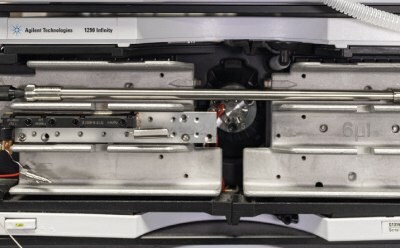
Figure 1.Supelco® analytical HPLC column installed onto an Agilent® 1290 U/HPLC instrument. Notice how the column comfortably fits into the column oven.
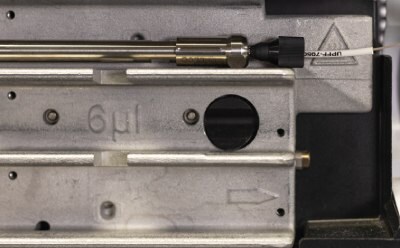
Figure 2.Zoomed-in picture of the column connected properly to the inlet tubing.
In addition to the column fitting into a column oven correctly, it is just as important that the column connecting nuts be seated properly in both the inlet and outlet ports of the column. All Supelco® columns use Parker fittings, nuts and ferrules, which is the industry standard in HPLC/UHPLC. By not seating these nuts properly in the column, a mixing chamber (dead volume) can be formed at the interface between the column and the fitting. This mixing chamber can impart additional band broadening (an increase in peak width) in the chromatographic results, which will lead to an overall decrease in efficiency and resolution. Also, when connecting an HPLC column, it is crucial that the shortest length possible be used in plumbing the instrument going from injector to column and column to detector. Excessive tubing length can lead to a decrease in efficiency due to the added system dead volume. Along with tubing length, tubing inner diameter (I.D.) should be considered, and the smallest, practical I.D. should be utilized (typically 0.010 in I.D. and 0.005 in I.D. tubing is used for HPLC and UHPLC instruments, respectively). Utilizing the narrowest I.D. tubing will lead to lower system dead volume and higher chromatographic efficiency. Fortunately, the Supelco® HPLC portfolio has a comprehensive collection of accessories to optimize the performance of your instrument and ensure the most efficient results are generated from your HPLC column.
Beyond what was mentioned above, the end fittings of some HPLC columns (e.g., Chromolith® columns) consist of PEEK, while others are made out of stainless steel. Mounting metal capillaries with 1/16‘‘ outer diameter and a metal cutting ring fixed to a 3 mm drill hole length can damage the PEEK hardware (both column housing and end fitting) and the silica bed of the aforementioned columns. To avoid any damage, use either flexible metal capillaries (0.25 mm outer diameter) with a polyvinylidene fluoride (PVDF) cone or PEEK capillaries with PEEK screws and adjustable plastic ferrules.
HPLC Guard Columns
Prior to injecting the sample onto the HPLC column, it is highly recommended to perform sample preparation techniques (filtration, extraction, solid phase extraction (SPE), etc.) on the sample if it contains large, particulate matter, or other undesirable components. Failure to perform sample prep on the sample can lead to a drastic decrease in the column lifetime as particulate matter begins to accumulate on the column frit and/or the stationary phase particles begin to adsorb undesirable sample components (note: Chromolith® monolithic HPLC columns do not have frits; this is one reason for the extended lifetime of these columns). Even if sample prep is performed on a sample, sometimes, not all impurities are removed. In these instances, a guard column should be employed to protect the analytical column from being compromised.
There are two common types of guard columns manufactured for use with Supelco® U/HPLC columns: a stand-alone guard column (example in Figure 3) that has to be connected to the main column by a capillary and a direct connect guard cartridge (example in Figure 4). The direct connect guard cartridge is composed of three pieces (2 fitting parts and the guard cartridge) as depicted in Figure 5; Figure 6 shows the direct connect guard cartridge connected to a 25 cm long HPLC column. As can be seen in the figure, the main and guard column together still fit comfortably in the column oven and all metal parts of the set up do have contact to the heating elements ensuring reliable thermal conductivity. All stand-alone guard columns and direct connect guard cartridges are compatible with all HPLC, UHPLC, and UPLC® instruments.
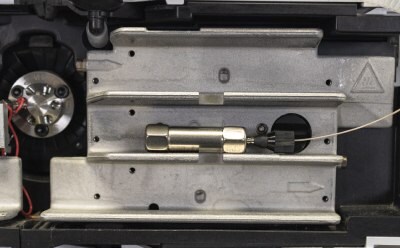
Figure 3.Stand-alone guard cartridge connected to inlet tubing. A second piece of tubing with a connecting nut is required to connect to the analytical column.
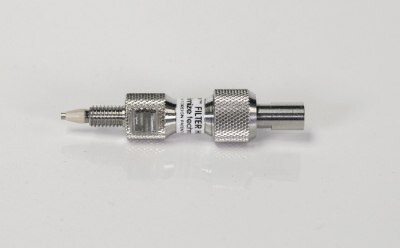
Figure 4.Direct connect guard cartridge. This type of guard column does not require any connecting tubing to connect to the analytical column; it screws right into the column inlet (see also Figure 6).
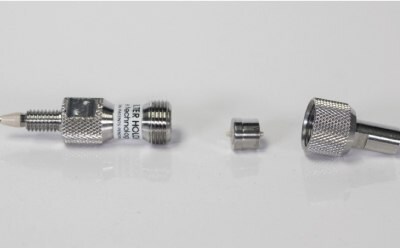
Figure 5.Components of the direct connect guard cartridge.
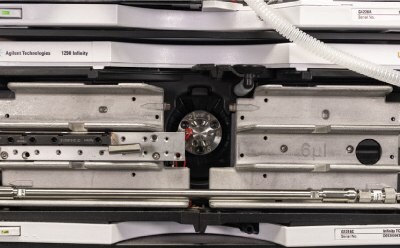
Figure 6.Direct connect guard cartridge connected to a 25 cm length analytical column. Even with this long geometry, the direct connect guard cartridge can still be connected to the column and fit inside a column oven ensuring thermal consistency.
Capillary & Prep Columns
In addition to analytical-scale columns, the Supelco® HPLC portfolio also contains capillary and preparative columns for selected stationary phases. Just as with the analytical-scale columns, these capillary and prep columns are compatible with all vendors’ capillary and prep LC systems, respectively. As an example, Figure 7 displays a Supelco® capillary U/HPLC column connected to a Thermo Fisher Scientific® Ultimate 3000 capillary U/HPLC instrument.
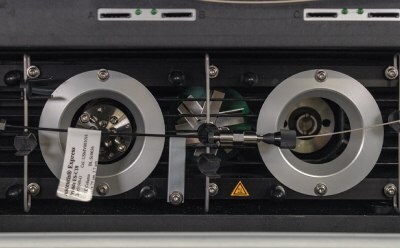
Figure 7.Capillary U/HPLC column connected to a Thermo Fisher Scientific® Ultimate 3000 capillary U/HPLC system. Complete system.
The Supelco® HPLC portfolio is a comprehensive column and accessories portfolio that is 100% compatible with any HPLC, UHPLC, or UPLC® system. All columns fit within all column ovens from various instrument vendors, and our HPLC accessories can easily be installed onto any instrument without fear of damaging the instrument. Products from the Supelco® HPLC portfolio are a valuable and reliable choice for your U/HPLC or LC-MS workflow.
See more in our HPLC and UHPLC Column Selection Guide
Para continuar lendo, faça login ou crie uma conta.
Ainda não tem uma conta?